- Submissions

Full Text
COJ Nursing & Healthcare
Evaluation of Total Quality Management Program for Unit Nurse Managers at Menoufia University Hospital, Egypt
Fouada Mohamed Shaban, Sanaa Moustafa Safan and Soha Mamdouh Elkholy*
Department Nursing Administration, Menoufia University, Egypt
*Corresponding author: Soha Mamdouh Elkholy, Department Nursing Administration, Menoufia University, Egypt, Email:mamdouh.soha@yahoo.com
Submission: July 13, 2018;Published: October 11, 2018
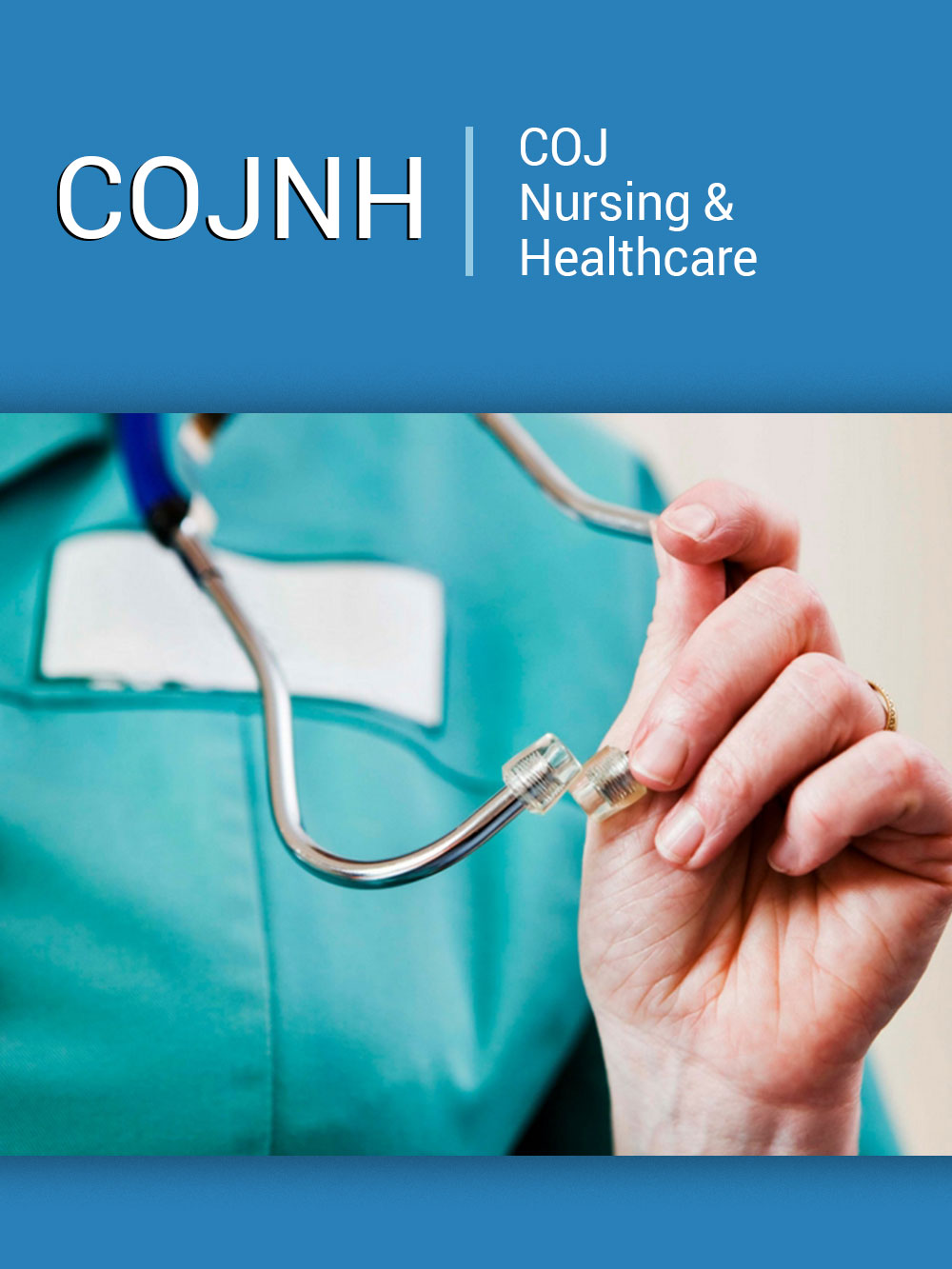
ISSN: 2577-2007Volume4 Issue2
Abstract
Background: The nurse manager is a significant facilitator of quality management and the In- corporation of process improvement into day-to-day management functions. The success of a quality management program demands that the nurse manager be involved by providing leadership to the nursing staff.
Aim: The aim of this study was to evaluate an educational program of total quality management for unit nurse managers at Menoufia University hospital.
Design: A quasi-experimental research design with pre, post, and follow-up assessment was used in carrying out this study. The study was conducted at Menoufia university hospitals which composed of three hospitals, (Main university hospital, Specialty hospital, and Emergency hospital) and Oncology institute.
Result: The majority (61.7%) of unit nurse manager’s level of knowledge was at poor level in pre- test, while none of them were at poor level in both post program and follow-up tests. The Main University hospital showed that pre-program unit nurse managers (50% and 45%) were at poor and average level of knowledge on TQM respectively. While post program and follow-up test showed that no one at the poor level. Specialty hospital showed that pre-program unit nurse managers (81.3%) were poor level of knowledge on all TQM items. While post program and follow-up test showed that no one at the poor level of knowledge. The Emergency hospital showed that pre-program unit nurse managers (55.6%) were at poor level of knowledge on TQM. While post program and follow-up test showed that no one was at the poor level of knowledge but. Also, the Oncology institute showed that pre-program unit nurse managers (66.7%) were at poor level of knowledge on TQM. while post program and follow-up test showed that no one was at the poor level of knowledge but all of them their knowledge was at good level.
Conclusion: Pre-program the unit nurse managers showed poor knowledge level of TQM indicate needed for educational program on TQM. Implementing of properly prepared program include TQM criteria for healthcare, organizational development, organizational effectiveness, evaluation of patient outcomes, nursing information system, patient rights and unit nurse manager and staff nurses’ roles significantly improved unit nurse managers’ knowledge on TQM at post program and follow-up tests
Keywords: Evaluation; Total quality management program; Unit nurse managers
Introduction
The nurse manager is a significant facilitator of quality management and the incorporation of process improvement into day-today management functions. The success of a quality management program demands that the nurse manager be involved by providing leadership to the nursing staff. Nurse Managers need to embrace their accountability for quality issues as envisioned in their quality focus Catherine [1]. The unit nurse managers are leaders of quality in their units, they should encourage the participation of everyone in the decision-making process, facilitate and participate with the staff in the process, help the group to define and achieve objectives. Also show the importance of each member in the team because ev eryone can contribute, distribute tasks according to responsibilities and share the merit of achievements Feldman et al. [2]. The legal obligation for quality management, assessment of service quality provision, the sophistication of medical care and increasing costs of health care are causes for change the quality of care and service provided to patients to be priority in various nations Johnson [3]. Evaluation of TQM programs effect on healthcare both internally and externally assists hospitals through monitoring clinical trends such as infection rates and readmissions which will increase the cost of providing patients care. Monitoring quality programs for reducing inefficiencies, commonly considered waste, and provide value-added to the organization Crystal [4].
Hospital executives are responsible for monitoring hospital- wide quality programs in their weekly executive meetings by examining hospital dashboards from the quality improvement department. Then determining the strategic direction of the hospital and integrating quality programs at the highest level of the organization through championing of the improvement projects as well as funding dedicated quality improvement departments and skilled personnel to staff them Koning et al. [5]. Therefore, attending educational TQM program and training are very important for unit nurse managers to be highly productive for implementing TQM within their unit, teaching their staff nurses the philosophies of TQM, training them interpersonal skills, the ability to function within teams, problem solving, decision making, job management performance analysis and improvement, work economics and technical skills Fottler [6]. Evaluation of the educational program on TQM for unit nurse managers to improve their knowledge is very important.
Because the success of that educational program will not only improve their knowledge but also improve their abilities for identifying and improving different unit work processes. Also, they can use a set of statistical data base and information system and analytical tools to study unit work process and evaluate its success. As well as empower the team of staff nurses to take charge of the operations of their own work, encourages continuous learning and personal responsibility Prabha et al. [7].
Aim of the Study
The aim of this study was to evaluate an educational program of total quality management for unit nurse managers at Menoufia University hospital through developing, implementing evaluating an educational program of TQM for unit nurse managers at Menoufia University hospital.
Subjects and Methods
Research design and setting
A quasi-experimental research design with pre, post, and follow- up assessment was used in carrying out this study. The study was conducted at Menoufia university hospitals which composed of three hospitals, (Main university hospital, Specialty hospital, and Emergency hospital) and Oncology institute.
Subjects
The sampling population of this studies all unit nurse managers at Menoufia University hospitals with at least one year of experience and had bachelor or degree in nursing. Sample size: The total sample size included (60) Unit nurse managers twenty of them were from the Main University hospital, sixteen from Specialty hospital, eighteen from Emergency hospital, and six from Oncology institute.
Tool of data collection
Data collected by two tools to assess knowledge of unit nurse managers on TQM.
Tool 1: The TQM knowledge test (pre–post-test). (Appendix 4). This test was developed
by the researcher to test the participant’s knowledge related to TQM. The questions were in the form of true and false, multiple- choice, and matching types, it consists:
A. Part one: Simple identification data include name and work hospital.
B. Part two: To determine unit nurse managers level of knowledge about TQM.
Tool 2: Total quality management program were six sessions concerning TQM criteria include
TQM in healthcare, organizational development, organizational effectiveness, evaluation of patient outcomes, nursing informatics system and patient rights and responsibilities and staff nurses and unit nurse manager roles (Appendix 5).
Fieldwork
At the beginning it was necessary for the researcher to introduce herself and briefly explain the aim of the study. The questionnaire was distributed to all nurse managers inside the selected hospitals in free cession after getting the permission from hospital administrator and obtaining the approval the data collection phase of the study was carried out in ten months from 15/5/2013 to 15/3/2014. The time was estimated to be 30 minutes for answering test.
Ethical considerations
The study was approved by the ethical committee of the faculty of Nursing, Menoufia University. Written permission was obtained and directed to the administration of the hospital which was selected, and then the researcher explained the aim of the study to medical and nursing director to obtain agreement. The study was conducted with careful attention to ethical standards of research and the rights of participants.
Statistical analysis
The collected data was organized, tabulated, and statistically analysed using SPSS version 20 software package. Cronbach alpha coefficient was calculated to assess reliability of the tools through internal consistency. For quantitative data the mean and standard deviation were used. To compare, the significant difference of means and the test ANOVA were used. For qualitative data the number and percent distribution were calculated. Chi square was used as a test of significance. Statistical significance was considered at p-value< 0.05.
Result
Socio-demographic characteristics of unit nurse managers (33.3%) were working in the Main University hospital. Majority (83.3%) had bachelor’s degree; also (51.66%) were in the age group 35-< 40 years with mean age value 38.75±7.40. Regarding years of experience (46.8%) of unit nurse managers had 10-< 14 years of ex perience with mean 10.33±2.87 years. The majority (95%) of unit nurse managers were married and (88.3%) didn’t attend previous quality programs (Table 1 & 2). Represents differences between total unit nurse managers level of knowledge for TQM at pre, post, and follow-up test. The majority (61.7%) of unit nurse managers level of knowledge was at poor level in pre-test, while none of them were at poor level in both post program and follow-up tests. Also, minority (3.3%) of unit nurse managers their knowledge was at good level, while this percent had greatly increased to (98.3% & 93.3%) respectively in post program and follow-up tests. Table 3 shows unit nurse manager level of knowledge for TQM program items at pre, post, and follow-up test at the Main University hospital. Pre-program the unit nurse managers (85%) were at poor level of TQM in healthcare and organizational development. While post program no one was at poor level of knowledge but (75%) were at good level decreased to (25%) at follow-up test.
Table 1:Socio-demographic characteristics of unit nurse managers (n=60).
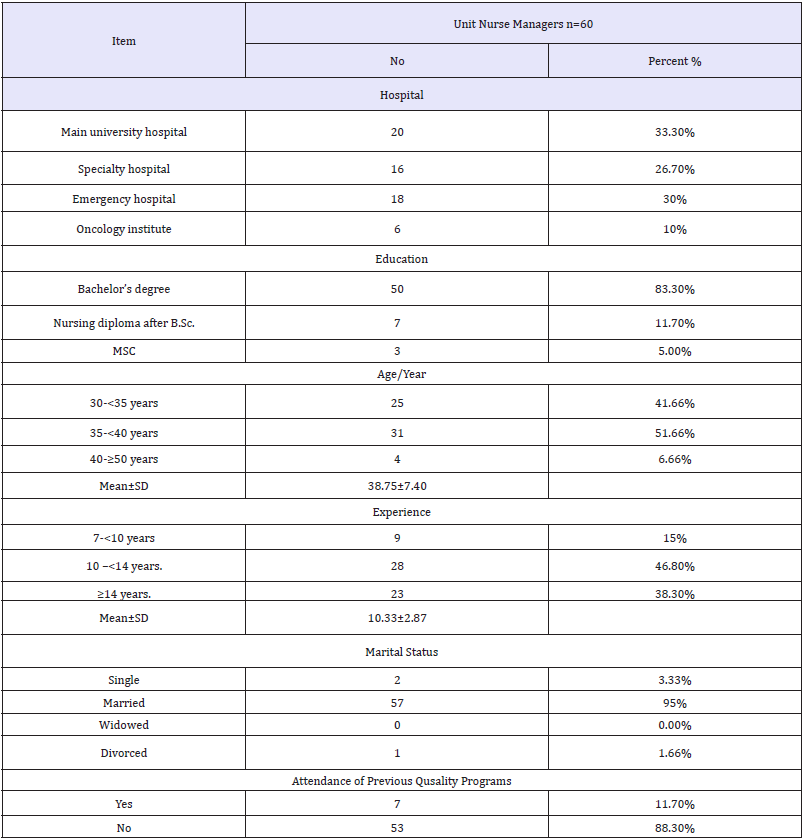
Table 2:Differences between total unit nurse managers level of knowledge for TQM at pre, post, and follow-up test (n=60).

Table 3:Unit nurse managers level of knowledge of TQM program items at pre, post, and follow-up test for Main University hospital (n=20).
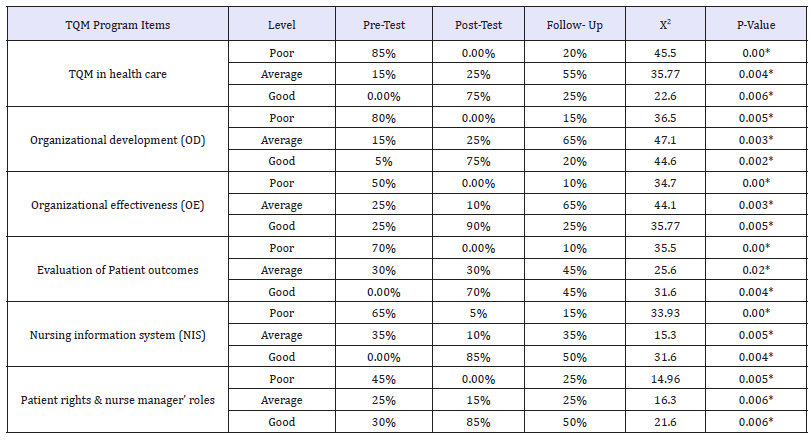
*Significant at P≤0.05.
But organizational effectiveness showed that at pre-program unit nurse managers (50%) were at poor level. While post program no one was at poor level of knowledge but they (90%,25%) respectively were at good level at post and follow-up test. Evaluation of patient outcomes showed that at pre-program unit nurse managers (70%) were at poor level. While post program showed that no one was at poor level of knowledge but they (70%,45%) respectively were at good level at post and follow-up test. Also nursing information system showed that at pre-program unit nurse managers (65%) were at poor level. While post-program few of them (5%) still at poor level of knowledge but (85%,50%) respectively were at good level at post and follow-up test. Beside pre-program unit nurse managers (45%) were at poor level of knowledge on patient rights and nurse manager role. While post program showed that no one was at poor level of knowledge but (85%,50%) respectively were at good level at post and follow-up test. Table 4 shows unit nurse manager level of knowledge for TQM program items at prepost, and follow-up test for the Specialty hospital. Pre-program none of unit nurse managers their knowledge was at good level for all items of TQM. While post program ranges (43.8%,93.8%) their knowledge was at good level, decreased to range (18.8%-75%) at follow-up for all items of TQM. But unit nurse managers range (56.3%-87.5%) pre-program their knowledge were at poor level. While post program none of them was at poor level of knowledge for items of TQM in healthcare and patient rights & nurse manager role. Still few percent (6.3%-18.8%) their knowledge were at poor level for all items of TQM at follow-up test.
Table 4:Unit nurse managers level of knowledge of TQM program items at pre, post, and follow-up test for Specialty hospital (n=16).
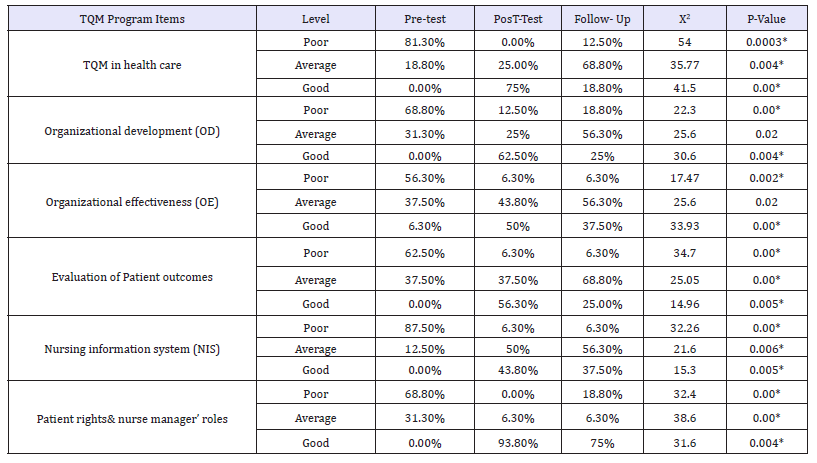
*Significant at P≤0.05.
Table 5:Unit nurse managers level of knowledge of TQM program items at pre, post, and follow-up test for emergency hospital (n=18).

*Significant at P≤0.05.
Table 5 shows unit nurse manager level of knowledge for TQM program items at pre-post, and follow-up test for Emergency hospital. Pre-program few (5.6%-16.7%) of unit nurse managers their knowledge was at good level for all items of TQM. While post program unit nurse managers’ knowledge significantly increases to range (66.7%-83.3%) decrease to range (27.8%-61.6%) for all items of TQM at follow-up test. However, unit nurse managers range (44.4%-83.3%) pre-program their knowledge were at poor in all items of TQM program. While post program still equal few percent of them (5.6%) their knowledge was poor for items of TQM in healthcare, OE, OD, evaluation of patient outcomes, and NIS. While none of them had poor knowledge for item of patient rights and nurse manager role. Range (5.6%-22.2%) were at poor level for items of TQM in healthcare, OD, evaluation of patient outcomes, and patient rights & nurse manager role. Except items of OE and NIS none were at poor level at follow-up test.
Table 6 Shows unit nurse manager level of total knowledge of TQM program items at pre, post, and follow-up test for Oncology institute. Pre-program none of unit nurse managers their knowledge was at good level for all items of TQM except (16.7%) had good knowledge for item of NIS. While post programs all unit nurse managers their knowledge was at good level. But at follow-up these percent significantly decreased to range (50%-83.3%) for all items of TQM. Unit nurse managers range (66.7%-100%) pre-program their knowledge was at poor level in all items of TQM program. While post program and follow-up none of unit nurse managers their knowledge was at poor level except (16.7%) at follow-up their knowledge was at poor level for item of TQM in healthcare.
Table 6:Unit nurse managers level of knowledge of TQM program items at pre, post, and follow-up test for Oncology institute (n=6).
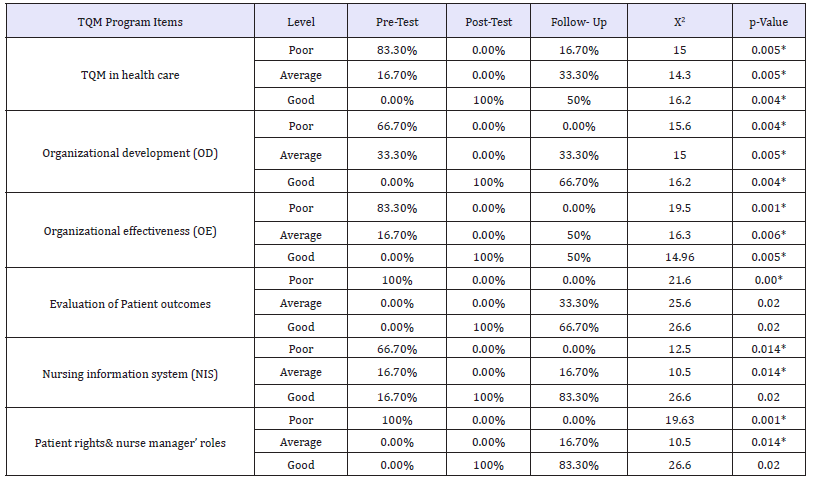
*Significant at P≤0.05.
Table 7:Differences between unit nurse managers each level of total knowledge on TQM at pre, post, and follow-up test for study four hospitals (n=60).
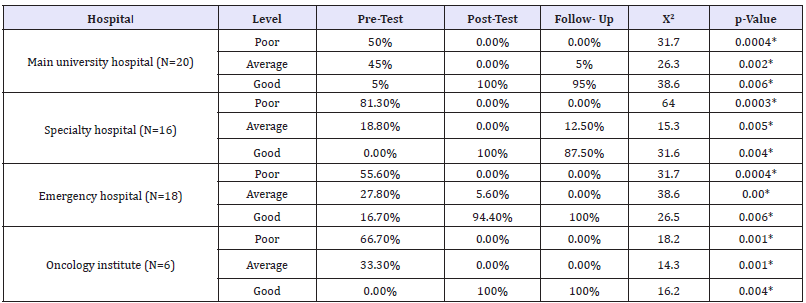
*Significant at P-value≤0.05.
Table 7 represents differences between unit nurse managers each level of total knowledge on TQM at pre, post, and follow-up test for study four hospitals. There were statistically significant differences at (p≤0.05) between unit nurse managers total level of knowledge at pre, post, and follow-up test for the four hospitals.
The Main University hospital showed that pre-program unit nurse managers (50% & 45%) were at poor and average level of knowledge on TQM respectively. While post program and follow-up test showed that no one at the poor level but (100%,95%) were at good level respectively. Specialty hospital showed that pre-program unit nurse managers (81.3%) were poor level of knowledge on all TQM items. While post program and follow-up test showed that no one at the poor level of knowledge but (100%, 87.5%) was at good level respectively. The Emergency hospital showed that pre-program unit nurse managers (55.6%) were at poor level of knowledge on TQM. While post program and follow-up test showed that no one was at the poor level of knowledge but (94.4%,100%) were at good level respectively. Also, the Oncology institute showed that pre-program unit nurse managers (66.7%) were at poor level of knowledge on TQM. while post program and follow-up test showed that no one was at the poor level of knowledge but all of them their knowledge was at good level.
Discussion
TQM is one of the most important changes which have taken place in the field of health care management. TQM is a comprehensive and applied strategy to achieve administrative development and improve the quality of services to respond to the needs and expectations of the society. In fact, the purpose of TQM is optimizing human powers and improving the quality of patient care through establishing the system in the units. TQM is not regarded as the final process of improvement, but everyone should try to achieve it and view improvement as a continuous process Farzianpour et al. [8]. Therefore, the aim of the present study was to evaluate an educational program of TQM for unit nurse manager in Menoufia University hospitals. Regarding, Sociodemographic data. The result indicate that the majority of unit nurse mangers had bachelor degree in nursing, at mean age 38.75 and had mean 10.33 years of experience.
Really the efficient unit nurse mangers are those having bachelor’s degree in nursing being at middle age and had high level of competences from several years of experience related to managerial functions. Based on pre-test of TQM program it was found that there was poor level of knowledge for unit nurse managers about TQM. Therefore, there was a need for implementing of educational program on TQM to improve their knowledge. Findings revealed that there was significant improvement of unit nurse managers’ total knowledge about TQM immediately post implementation of program and at follow-up compared to pre-program.
This improvement was related to the well preparation of TQM program according to unit nurse manager need, the careful choose of suitable method of teaching to be used and provision of clarified handouts. Really the unit nurse managers were enthusiastic to learn showed high expressed need to learn about TQM and they were committed to attend program sessions. Kunkel [9] study about quality management in hospital department’s empirical studies of organizational models acta universities supported the study result and revealed that all health care workers after TQM educational program contributed to achieve an overall high quality of care. As the managers and administrators know to plan and distribute resources, nurses and nursing assistants know to provide patients with professional care, engineers will have to procure and maintain advanced technical equipment, as well as cleaning staff know to maintain antiseptic environments.
Mohammed [10] study about the effect of leadership training program on head nurses job performance at Banha University hospital, support result of present study and stated that head nurses had significant improvement in their knowledge scores in all items of leadership training program immediately and after three months post program and added that it was attributed to their ability of gaining knowledge easily and emphasized the importance of educational opportunities to strengthen and update their knowledge. Regarding to unit nurse managers knowledge of TQM in healthcare criteria the present study revealed that their level of knowledge had significantly improved in majority of items immediately post program and follow-up compared to pre-program.
This improvement due to their understanding of all items of TQM in health care during program sessions. Currently they know that TQM insist on zero defect and improve system through education and training. Therefore, it is important for TQM to empower staff nurses to enlarge unit and organizational improvement. As well as long term commitment of staff nurses to quality and unit nurse manager leadership are very important for effective TQM. Now they can measure quality based on structure, process, and outcome standard. Beside they realize that patients’ satisfaction with nursing care, educational information and staff nurses’ satisfaction are very important. Really their knowledge about quality principle, elements, standard and empowerment of workers were improved.
Khairul [11] study about the impact of TQM practice on patients’ satisfaction through organizational flexibility, supported present study result and revealed that in healthcare sector TQM motivates the staff to increase their productivity through high and continuous performance. The improvement of both staff and patient’s satisfaction were due to organization manager strategies and effective plans to make some changes in the structure, process, system of work, and employee for achieving the objectives of TQM. In the same line Patrick [12] doctoral thesis about hospital healthcare executives’ attitudes and beliefs on the impact that the healthcare providers and systems survey have on service quality and hospital reimbursement, indicated that hospital healthcare nursing executives showed believe that service quality is the primary driver of their organization and their hospital should focus on delivering high quality levels of service to their patients. They must be aligned with the vision that the purpose of their hospital is to provide quality levels of service to their community. And assessed that the role of their hospital is to provide quality health care to their patients.
The organization development criteria of TQM program result for present study revealed that unit nurse manager level of knowledge had significantly improved immediately post program and follow-up compared to pre-program. Those unit nurse managers showed wright answers in all items of organization development. While they understand that the organizational development takes long term approach to increase, which requires work interaction, feedback, manage staff nurses by objectives and encourage their interdependence. They now are sure that the organizational holders, leaders, and owners internal and external are not the only responsible for organizational development but also each unit nurse manager and staff nurses are charged with developing their own unit.
Ralph et al. [13] reported that no matter what the discipline, common TQM goals and beliefs must be established at work. Healthcare professionals commonly train in isolation of one another and this lack of interaction has the potential for a lack of understanding of professional’s values, cultures, and knowledge bases. They further maintained that this lack of understanding could in turn lead to ineffective inter-professional experiences. And proposed that inter- professional education should precede inter-professional practice, and that this strategy must be incorporated into educational programs to strengthen inter-professional work in clinical areas.
The present study revealed that unit nurse manager knowledge about organizational effectiveness was significantly improved immediately post program and follow-up compared to pre-program. The fact is that they had wright answers in all items of organization effectiveness including that high-performance system model focus on excellent performance within the organization and that human resource planning focus on value added activities and must be an integral part of management team. Staffing review and succession plan must measure managers and leaders on the same performance pattern. Also, unit nurse managers currently know the importance of organization effectiveness to adapt to stagnant environment, and that strategies for organization effectiveness are talent exclusion, advancement and staffing review and succession plan. As well as organization effectiveness is necessary for greater progress on mission achievement. Beside they are sure that leadership is the core capacity to organization effectiveness and that newly appointed nurse managers need training for communication skills.
Duggirala et al. [14] study about patient-perceived dimensions of total quality service in healthcare, support present study result and suggested that, in a critical area such as health care, employing training practices are important to ensure the employee is equipped with the right knowledge. In a hospital setting continuous training of the staff in patient care service is vital. Adding that changes in staff nurse training will improve nurse retention and satisfaction. Noelle [15] study about committing to mentorship: nurse managers perceptions of their roles in creating mentoring cultures, supported the present study result and stated that managers promoted upcoming professional development opportunities, allowed staff time off to attend workshops, or arranged for in-services to be given on the unit. By promoting and encouraging education opportunities for staff, an atmosphere of learning was created.
Concerning to unit nurse managers knowledge related to items of evaluation of patient outcomes, the present study revealed that their knowledge had significantly improved immediately post program and follow-up compared to pre-program. Apparently, they had wright answers in all items of evaluation of patient outcomes as evaluation of patient outcomes requires nurse to assess, monitor, and appraise patient response to nursing action. As well as they know that structure evaluation focus on nursing action with each component of nursing process. Purdy et al. [16] study about effects of work environments on nurse and patient outcomes, support current study result and found that positive patient outcomes resulted when managers employed strategies to develop professional growth of staff, to provide access to information required to deliver care, and to provide support, guidance, and time allowing nurses to work more effectively. In the same line Khairul [11] supported the present study result and stated that implementing health care activities can be measured by the process of quality, with the speed performing of service and they can be used to pinpoint problem service delivery and to suggest specific solutions. Added that process indicators can be used by front line medical staff (nurses, physicians and manageability.
The present study revealed that unit nurse manager level of knowledge about informatics system had improved immediately post program and follow-up compared to pre-program. Apparently, those unit nurse managers understood program content and gave the wright answers in all items of nursing information system. So, they appreciate that nursing information system facilitates self-scheduling besides handling staff nurses’ absence and their overtime. It presents staff nurses staffing level, collect data, analytic tools, operating policies & procedures to support unit nurse manager decision-making. Therefore, when nurse manager decid ing application of information technology she should network with other users, inform, and train those users. Really unit nurse manager appreciates that nursing information system enhances patient care through patient care recording. As well as the professional data, personal & management records and patient outcomes sources of data are easy to attain from the information system.
Seth et al. [17] study about service quality models, supported the present study result and said that the philosophy of TQM stresses decision making involving analysis of information on customer needs, operational problems and success of improved attempts. As suggested by TQM literature the organizations that consistently collect and analyse information will be more successful than those that do not.
The finding of study revealed statistically significant improvement of unit nurse manager level of knowledge on patient rights and roles of staff nurse managers and staff nurses for all its items at post program and follow-up compared to pre-program. Those unit nurse manager are sure that patient has a reasonable choice of care providers and need to have useful information about provider option. The primary role of unit nurse manager is to ensure maximum patient outcomes in her units. They appreciate the importance of their supervision for direct patient care providers and to be accountable to first level managers. Also, they know that they must respect patient rights and that every patient has responsibility to respect rights of other patients. However, staff nurses and unit nurse manager are responsible for patient safety and direct patient care.
Kunkel [9] supported the present result and assert that health care system should aim to be safe to avoid injuring patients when providing adequate care. Nurses require being effective to provide services based on science to those that are likely to benefit from them. As well as to provide care that is adapted to patient preferences, needs, and values during every stage of the caring processes. They appreciate that it is necessary to reduce waiting times for patients and staff, to avoid the waste of resources, and provide care of equal quality regardless of the personal characteristics of the patients. West et al. [18] study about leading, managing, and delegating, supported the current study result and revealed that effective leaders encouraged creativity and feedback, promoted the use of technology, facilitated personal relationships and personal development and involved members in decision making. In the same line Sullivan et al. [19] proposed that nurse managers who had personal characteristics that allowed them to be effective leaders, to be open and positive to the idea of mentorship and encouraging and to be supportive of mentoring relationships were more likely to establish and sustain mentoring cultures through their actions.
In the same line Noelle [15] revealed that nurse managers in his study promoted mentoring to new and existing staff, encouraged nurses to attend mentorship workshops, and distributed mentoring articles to members on their units. Managers in the study indicated they wanted to get to know their staff in order to be supportive, to understand their personal and professional needs, and to be able to strategically select appropriate mentors for protégés. They also felt that managers should be available to their staff and should frequently check-in with them. In addition, Linda [20] supported this current study result and approved that nurse managers are instrumental in role-modeling and setting expectations for staff nurses regarding the importance of high quality, transparent and patient-focused care. Also, they are the conduit of communication between upper management and the bedside staff, providing key messages and setting the culture for their units and organization. Nurse Managers are accountable to upper-level administration for implementation of the philosophy, goals, and standards of the hospital organization at the unit-level. In the same line West et al. [18] stated that nurse managers allow for expression of ideas, facilitation of choices, and encouragement of creativity to maximize the resources available to create and sustain effective mentoring cultures. Hassan [21] noted that management of hospitals should change the corporate culture towards patient medical care and individual employees must be encouraged to work as teams and focus on patients and study their needs and requirements.
At the same time management should welcome risk taking and provide the suitable innovation atmosphere to enhance continuous improvement. Crystal [4] reported that hospital executives monitor hospital wide quality programs in their weekly executive meetings by examining hospital dashboards from the quality improvement department, determining the strategic direction of the hospital and integrating quality programs at the highest level of the organization. And added that hospital executives at these sites demonstrate their commitment to quality improvement in healthcare by championing the improvement projects and funding dedicated quality improvement departments and skilled personnel to staff them. Executive quality is paramount for a quality improvement program to develop especially in the early stages when quality improvement programs may be new to the hospital workers, hospital management, and the patients. However, the TQM educational and training program can ensure that unit nurse managers are trained in the tools and methods required for continuous quality improvement that allow them to competently participate in quality improvement initiatives and actually bring about their unit positive changes and allow for staff nurses to eliminate waste, increase process efficiency and improve their services which will ultimately result in improved patient satisfaction. The significant attention and importance of training lead to the increased number of training courses, body of knowledge, quality frameworks, certification programs and expert trainers that all claim to teach and in still TQM principles
Conclusion
Pre-program the unit nurse managers showed poor knowledge level of TQM indicating need for educational program on TQM. Implementing of properly prepared program include TQM criteria for healthcare, organizational development, organizational effectiveness, evaluation of patient outcomes, nursing information system, patient rights and unit nurse manager and staff nurses’ roles significantly improved unit nurse managers knowledge on TQM at post program and follow-up tests. Recommendation for future research: Investigate contributing, facilitating factors and barriers for TQM, Study role of unit nurse manager for creating a quality culture and Study unit nurse manager level of adopting continual change and evidence practice.
References
- Catherine L (2004) Quality focus of the first line nurse manager and relationship to unit outcomes. Journal of Nursing Care Quality 19(4): 336-342.
- Feldman B, Schroeder G, Babara S (2005) A framework for quality management. Journal of Operations Management 11(8): 39-66.
- Johnson O (2011) The application of total quality management in health care organizations. University of Ilorin, Ilorin Total Quality Management, Ilorin, Nigeria, 11(9): 57-66.
- Crystal L (2008) Developing and implementing quality programs in the health care organizations. JONA 37(5): 55-56, 221-229.
- Koning H, Verner J (2007) Lean six sigma in healthcare. National Association for Healthcare Quality. Quality Magazine 45(3): 27-43.
- Fottler M (2010) Achieving service excellence: Strategies for healthcare. (2nd edn), Health Administration Press. Chicago, Illinois, USA.
- Prabha R, Vedmani M, Arkrasunsingh P (2011) Total quality management adoption in a public hospital: Evidence from Mauritius. Global Journal of Business Research 5(3): 67-77.
- Farzianpour F, Rahimi A, Beyzaiee S, Hosseini S (2012) Evaluation of the self-esteem managers in clinical wards of hospitals affiliated to Tehran university of medical sciences. Tehran University of Medical Sciences. World Applied Sciences Journal 16(5): 686-692.
- Kunkel S (2008) Quality management in hospital departments: Empirical studies of organizational models. Acta universities Upsaliensis, Digital Comprehensive Summaries of Uppsala Dissertation from the Faculty of Medicine 309(75): 16-18.
- Mohamed R (2012) The effect of leadership training program on head nurses job performance at Benha university hospital. Doctoral thesis in nursing administration, Faculty of Nursing, Benha University, Egypt, pp. 97-100.
- Khairul A (2011) The impact of TQM practice on patients’ satisfaction through organizational flexibility. Journal of Clinical Practice 11(2): 37- 41.
- Patrick F (2011) Hospital healthcare executives’ attitudes and beliefs on the impact that the healthcare providers and systems survey have on service quality and hospital reimbursement. Doctoral thesis of Education in Organizational Leadership. Pepperdine University Graduate School of Education and Psychology, Pacific Coast Hwy, Malibu, USA, pp. 32-55.
- Ralph R, Shaw S (2011) Dismantling barriers: Mentorship in emerging nurse-practitioner roles. Fresh insights and perspectives. pp. 413-431.
- Duggirala M, Rajendran C, Anantharaman R (2011) Patient-perceived dimensions of total quality service in healthcare. Emerald 15(5): 560- 583.
- Noelle K (2012) Committing to mentorship: Nurse managers’ perceptions of their roles in creating mentoring cultures. College of Nursing, University of Saskatchewan, Saskatoon, Saskatchewan, pp. 1-193.
- Purdy N, Laschinger H, Finegan J, Kerr M, Olivera F (2010) Effects of work environments on nurse and patient outcomes. J Nurs Manag 18(8): 901-913.
- Seth N, Deshmukh S, Vrat P (2007) Service quality models: a review. International Journal of Quality and reliability Management 22(9): 913- 949.
- West L, Hungerford KA, Yiu L (2010) Leading, managing, and delegating. (2nd edn), Toronto, Canada.
- Sullivan EJ, Decker PJ (2009) Effective leadership and management in nursing (7th edn), Upper Saddle River, NJ: Pearson Prentice Hall, USA.
- Linda K (2010) Nurse manager. Doctoral Philosophy Degree in Nursing. College of the University of Iowa, Iowa, pp. 112-126.
- Hasan A, Judeh M (2010) Measuring the implementation of total quality management: Ibn Al-Haytham hospital case study. Jbm journal 6(5): 114-119.
© 2018 Soha Mamdouh Elkholy. This is an open access article distributed under the terms of the Creative Commons Attribution License , which permits unrestricted use, distribution, and build upon your work non-commercially.
 a Creative Commons Attribution 4.0 International License. Based on a work at www.crimsonpublishers.com.
Best viewed in
a Creative Commons Attribution 4.0 International License. Based on a work at www.crimsonpublishers.com.
Best viewed in 







.jpg)






























 Editorial Board Registrations
Editorial Board Registrations Submit your Article
Submit your Article Refer a Friend
Refer a Friend Advertise With Us
Advertise With Us
.jpg)






.jpg)














.bmp)
.jpg)
.png)
.jpg)










.jpg)






.png)

.png)



.png)






